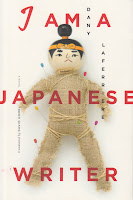~ Review: Halifax Herald June 2009
Serey is a young Cambodian sent to Montreal to study. He meets Anne and they fall in love, prowling the jazz clubs of Montreal. But the rise of the Khymer Rouge closes Cambodia’s borders, and years pass before Serey is able to return home to look for his family. He vanishes without word. Eleven years later, Anne sees a blurred likeness on a TV news clip and flies to Phnom Penh to search for him.
The backdrop of the Khymer Rouge’s regime of terror in the 1970's, which leaves an entire population traumatized and was responsible for the deaths of almost 2 million people, is not an easy counterpoint for a love story. The challenge for Echlin ‘was to find a language that could tell the stories’, not just Anne’s story but of the people who suffered around her.
Echlin writes with poetic intensity, moving through place and time with ease. The desperate poignancy of the stories Anne hears as she searches for her lover, and the sensual language of the love she feels is a mix that seems incompatible. There are times when the magnitude of loss and grief seems beyond words.” But Echlin’s ability to pare language to its essence is near perfect.
When an old woman tells Anne that she “lost my whole family during Pol Pot”, Anne is unsure how to respond, but there is nothing to say. “I only want you to know,” she the woman. It is for Anne to bear witness. “And once we know, what do we do?”
In the final chapters Anne’s now middle-aged heart grieves for her lost lover, for those long lost and her story ends with a lament that has resounded through centuries. “People everywhere look for their missing . . .Can no one find me even a bone to bury?”
Kim Echlin is an author who completed her doctoral thesis on Ojibway storytelling. She has travelled the world in search of stories and spent time in Cambodia researching The Disappeared. She lives in Toronto.



















![[pearls-web.jpg]](https://blogger.googleusercontent.com/img/b/R29vZ2xl/AVvXsEgMkss_bWU6YfohJn125TjRbXA9f4uUIzge-Z6Kfw0-c1PYl8Z0b-LBuYiTrUXJd_J8epRrXMtm5o_5UWf-K32z2OY3nO8LgHlCrM3GmvKnqLXMOgMcFIVedC29oud1yyHUklqjSpHz77I/s200/pearls-web.jpg)